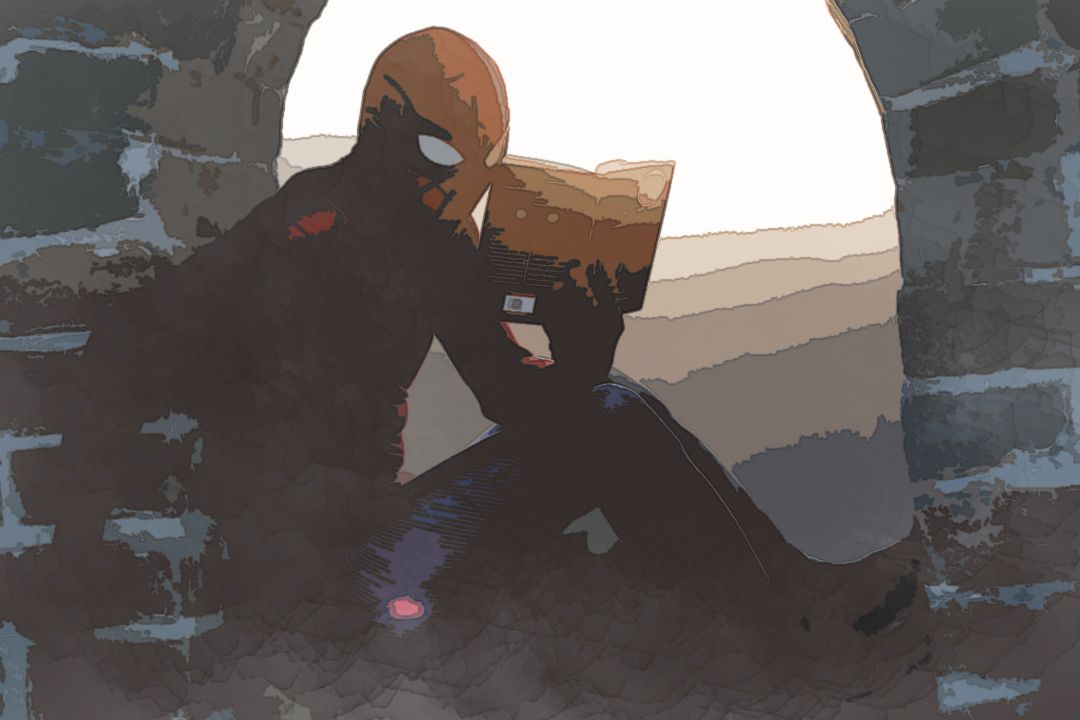Probability Theory is Nothing but Common Sense Reduced to Calculations

Tingling Spider Senses
Bathed in the soft silver light of the library's antique lamps, Spider-Man sat quietly at a mahogany desk that was as timeless as the knowledge it had supported through the ages. Around him, the grandeur of the library rose in silent testament to human curiosity. In this cathedral of contemplation, the hero whose life was marked by leaps and bounds sought grounding in the stillness of study.
The world knew him for his acrobatics and his battles fought in the warrens of the concrete jungle, yet few could fathom the cerebral skirmishes waged in the solitude of his own mind. Spider-Man, or Peter as he was known beyond the mask, always felt the thrum of his spider senses, a preternatural alertness that pervaded his being. In the realm of combat, this tingling was a herald of imminent danger, a spark before the flame. But here, amidst the hush of turning pages and the faint mustiness of old books, it took on a different hue—it was the vibration of connections being made, of patterns being recognized in the chaos of existence.
He reflected on the words of Pierre-Simon Laplace, whose insights into the calculus of probabilities seemed to describe the very essence of his heightened intuition:
The theory of probabilities is at bottom nothing but common sense reduced to calculus; it enables us to appreciate with exactness that which accurate minds feel with a sort of instinct for which ofttimes they are unable to account.
— Pierre-Simon Laplace (1749-1827)
Peter felt a kinship with Laplace's vision of the world, where instinct aligned with reason, where the spider senses that warned him of a falling beam or an unseen enemy were not unlike the mathematician's foresight in the dance of numbers. Probability, to him, was another form of spider sense—predicting outcomes, anticipating moves in the great chessboard of New York's ceaseless energy.
His battles had taught him that life's patterns emerged not just from the grand gestures but from the interstitial moments, the spaces in between. Like the delicate strands of a web, each choice he made, each life he touched, contributed to the intricate design of his city's destiny.
As he read, his fingers traced the equations that quantified uncertainty, translating the abstract into the concrete, turning what seemed like random chance into a series of predictable events. He understood that to grasp the mechanics behind his instincts was to hone them, to turn the tingling into a tool more precise than any web shooter he had ever engineered.
The quiet of the library lent itself to his musings, and in the dance of probabilities, he found a rhythm that resonated with the pulse of his own experiences. His life as Spider-Man, filled with split-second decisions and chaotic encounters, was itself a sequence of probabilities, each action a variable in an equation that determined the fate of a person, a neighborhood, or even the entire city.
This was the duality of his existence: Spider-Man, the hero of action and reaction, and Peter Parker, the seeker of knowledge and understanding. In embracing both, he found not only balance but a profound sense of purpose. With every thread he spun across the skyline, he wove the probabilities into existence, each a calculated step in the vast, ever-unfolding pattern of life.
In the depths of night, when the world outside slumbered beneath a blanket of stars, Spider-Man retreated into the labyrinthine corridors of his mind. Alone in his sanctum within the towering edifice of knowledge, he sought solace in the company of books that whispered secrets of ages past. The library, with its towering shelves and vaulted ceilings, was his refuge, a haven where he could shed the weight of his mask and immerse himself in the introspective embrace of thought.
The faint glow of lamplight cast gentle shadows across the worn pages of ancient tomes as Spider-Man pored over the works of philosophers and thinkers, his mind a maelstrom of contemplation. Here, in this realm of quiet reflection, he found resonance in the words of Emil Cioran, a philosopher who had peered into the abyss of human existence and found truth in the chaos.
Every thought derives from a thwarted sensation.
— Emil Cioran (1911-1995)
As the weight of Cioran's words settled upon him, Spider-Man felt a stirring within, a recognition of the profound connection between sensation and cognition. Each of his thoughts, he realized, was born from the crucible of experience, shaped by the myriad sensations that reverberated through his consciousness. The exhilaration of soaring through the night sky, the searing pain of loss, the electric thrill of victory—each sensation left an indelible imprint upon his psyche, a ripple in the vast ocean of his mind.
He contemplated the journey that had led him to this moment, the myriad sensations that had shaped his identity as both hero and man. The bite of a radioactive spider, a sensation tinged with both agony and power, had irrevocably altered the course of his life, propelling him down a path of self-discovery and self-sacrifice. The loss of his beloved uncle, a sensation of grief that had pierced his heart like a dagger, had instilled within him a sense of responsibility—a burden he bore with solemn determination.
In the quiet solitude of the library, Spider-Man confronted the tumultuous sea of his emotions, navigating the currents of sensation that threatened to engulf him. He understood that every thought, every action, was a reflection of the myriad sensations that pulsed through his veins—a symphony of feeling that gave meaning to his existence.
As the night deepened and the stars traced their silent arc across the heavens, Spider-Man closed his eyes, surrendering himself to the ebb and flow of sensation that enveloped him. In the stillness of the library, he found a fleeting moment of clarity, a glimpse into the infinite depths of his own consciousness.
With a sigh, he opened his eyes, the weight of the world once again resting upon his shoulders. The journey of self-discovery was far from over, but in the embrace of sensation, Spider-Man found strength—a beacon of light in the darkness that threatened to consume him. And as he rose from his seat, ready to face the challenges that awaited him beyond the confines of the library, he knew that he would carry the wisdom of Emil Cioran with him—a reminder that every thought, every sensation, was a testament to the boundless complexity of the human soul.

The planksip Writers' Cooperative is proud to sponsor an exciting article rewriting competition where you can win part of over $750,000 in available prize money.
Figures of Speech Collection Personified
Our editorial instructions for your contest submission are simple: incorporate the quotes and imagery from the above article into your submission.
What emerges is entirely up to you!
Winners receive $500 per winning entry multiplied by the article's featured quotes. Our largest prize is $8,000 for rewriting the following article;

At planksip, we believe in changing the way people engage—at least, that's the Idea (ἰδέα). By becoming a member of our thought-provoking community, you'll have the chance to win incredible prizes and access our extensive network of media outlets, which will amplify your voice as a thought leader. Your membership truly matters!


